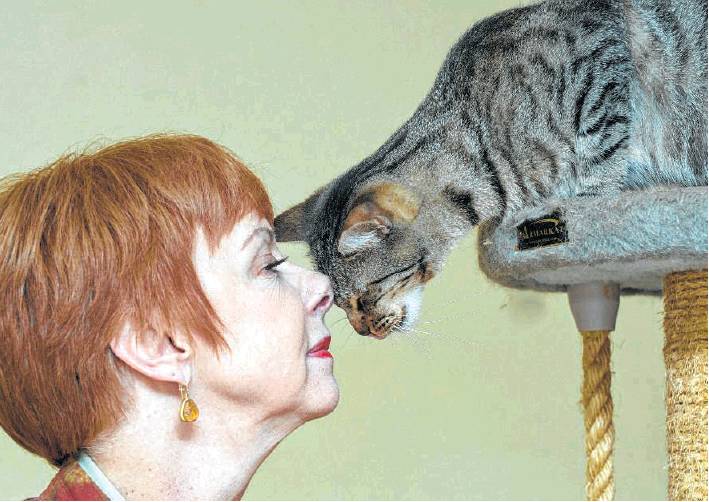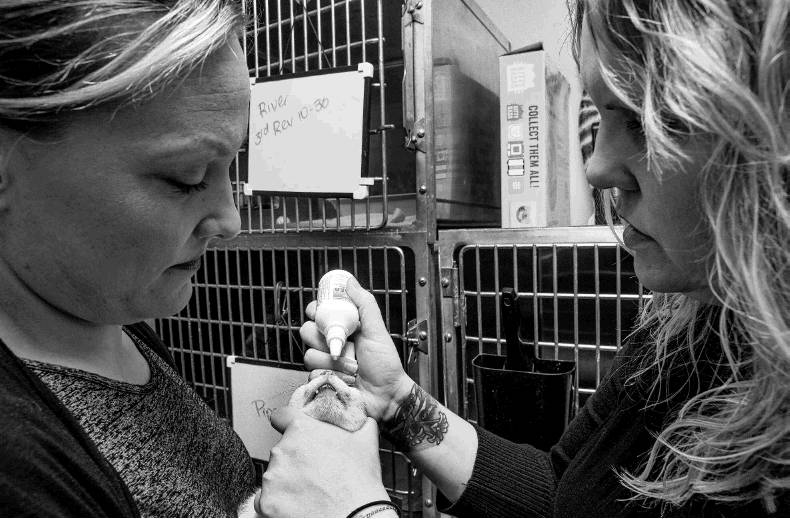Wayward Whiskers rescues stray cats with little hope
Local nonprofit helps special-needs felines find forever homes
By Peggy O’Hare STAFF WRITER
Though there are two dozen cats in the room, Sherry Pfau can name them all and tell you from where they came.
There’s Newton, who lost one of his front legs to an injury but gets around just fine on his three remaining limbs. There’s Mr. Kitty, who’s at least 17 years old and whose tongue always sticks out. Reggie, rescued from a hoarding situation in Missouri, has entropion, a condition that caused his eyes to scar.
All are in the care of Wayward Whiskers Cat Rescue, which saves the lives of stray cats battling medical conditions or injuries and cares for them until they get adopted — no matter how long it takes.
The San Antonio nonprofit takes special-needs felines off the streets and from local shelters, such as Animal Care Services, the Animal Defense League of Texas, the San Antonio Humane Society, Palm Valley Animal Center in the Rio Grande Valley and smaller shelters.
Wayward Whiskers is one of the only rescues in South Texas willing to accept stray cats diagnosed with feline immunodeficiency virus. FIV, as the virus is commonly known, suppresses the immune system, but a cat can live a normal life span with the condition and may not experience any complications.
Pfau, the executive director, started Wayward Whiskers in 2013 with a mission to provide the most unfortunate cats better lives and loving homes.
“I know that if I didn’t get involved and if I didn’t intervene that they would not be alive,” Pfau said of the animals she helps. “And they probably would have died a really horrible death.
“They’re little sentient beings and they suffer and they feel pain and they hurt. If I can do something to alleviate that, then it’s worth it.”
Wayward Whiskers wouldn’t survive without donations, Pfau said. The organization’s annual budget last year was $76,000, and nearly all its funding comes from individual donors.
The nonprofit’s website notes that Wayward Whiskers doesn’t receive any city or government funds. The group was awarded a $15,000 grant — a first — by the San Antonio Area Foundation earlier this year.
The nonprofit doesn’t take in cats surrendered by their owners, but accepts felines facing hopeless situations, such as strays who are blind, have suffered a broken leg or been hit by a car, are being bullied on the street by other cats or are diagnosed with FIV.
Some of those cats come to the group’s attention through reports from the public. Wayward Whiskers’ website allows visitors to submit intake requests, along with a description and photos of a cat in distress. Other cats the nonprofit helps come from local shelters.
“Our main focus is just the special-needs cats that nobody else really wants to take or deal with,” Pfau said.
Wayward Whiskers doesn’t impose a time limit for how long they keep cats awaiting adoption.
“We don’t euthanize for space or because a cat can’t get adopted,” Pfau said. “We just hold on to them until the right person comes along.”
All the cats the nonprofit offers for adoption can be found online.
Wayward Whiskers recently took in Chase, a cat who was found in McAllen with severe damage to his face. How he was hurt was a mystery, but Pfau said it was possibly due to a severe eye infection. Chase underwent surgery and lost one of his eyes, but he’s healed nicely. He also tested positive for FIV, so he was placed into the nonprofit’s FIV+ Sanctuary. In October, he became available for adoption.
The nonprofit also took in two cats from Kuwait in October — Georgina, who had intentionally been set on fire, and Pippen, who had been attacked by a dog. Both cats have made a full recovery.
“We’re a private rescue,” Pfau said. “We’re limited in space and manpower, so we have to pick and choose what cats we actually can take in.”
As of late October, Wayward Whiskers was caring for around 50 cats. About half of them — 29 in all — were residing at the nonprofit’s FIV+ Sanctuary, at Pfau’s home in the San Antonio area.
The remaining cats were housed in the group’s adoption room at Pfau’s home, on display at the nonprofit’s adoption center inside PetSmart’s West-over Hills store or going through quarantine periods that each cat is required to clear.
Wayward Whiskers also aims to educate the public about FIV. Cats with the virus can be adopted and live successfully in the same household with other cats who don’t have the condition as long as they don’t fight or bite each other, Pfau said.
“There’s a lot of misconception about it,” Pfau said of the illness. “A lot of people think it’s highly contagious, and it’s not.”
Wayward Whiskers typically adopts out around 90 to 100 cats each year. But the nonprofit is getting more exposure this year through the adoption center it launched in February inside the PetSmart store at Loop 410 and Texas 151. The group has placed at least 140 cats with “forever families” since Jan. 1.
Adoption fees vary. A cat diagnosed with FIV can be adopted for $35. At the group’s PetSmart adoption center, adult cats without FIV can be adopted for $75 each, while kittens free of FIV can be adopted for $100 each.
Every Wayward Whiskers cat is spayed or neutered, gets vaccinated and microchipped, and undergoes testing for FIV and feline leukemia before it gets adopted.
There are advantages to adopting from a smaller, private rescue, Pfau said.
“We know the cats, we know their personalities, we know their likes and dislikes ... so we can give you a better idea what kind of cat you’re getting,” she said.
Wayward Whiskers serves a need in the community, said Clayton Cox, 19, a Cibolo native and College Station resident who adopted two cats from the nonprofit and fostered five other cats in the group’s care in the past year.
“Not a lot of places are going to take on that kind of expense, that commitment,” Cox said, noting the group helps animals “that would otherwise be overlooked by other organizations.” pohare@express-news.net

